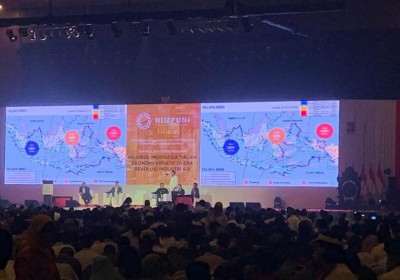Looking to Globalise Creative Economy, This is How Indonesia Catch-Up to K-Pop
April 26, 2019
The Minister of Communication and Information Rudiantara when describing the Sky Highway. (Photo: Public Relations Ministry of Communication and Information)
“Bali’s Kecak Dance was the first creative economy in Indonesia, famous around the world in the 1930s,” said Triawan when speaking on a talk show called “Indonesian Millennials in Creative Economy on the Industrial Revolution 4.0 era”, on April 3, 2019.
This means, conveyed Triawan, that monetisation of national culture was done first by Indonesia than Korea. To catch up, he said Bekraf is conducting a number of steps to develop artists and the art communities. One of them is through the Portamento application platform using blockchain technology (recording system or database spread across the network).
"When a musician includes his/her work in the Portamento database, the system will calculate the value of the work based on how many times the song is downloaded or listened to online,” continued Triawan.
The Portamento Project was created to protect the copyrights of the artists. In Portamento, there is a system connecting copyright owners with consumers. In 2018, Portamento’s academic script was completed as the basis to build the electronic Portamento system for further stages. This platform will be undertaken this year.
In addition to Portamento, Bekraf has established a cooperation with local art communities and introduced Indonesian music in international events. Triawan presented his steps in bringing several dangdut musicians to the SXSW art festival in Texas, United States, for three consecutive years.
Other efforts include Museum Song Digitalisation for Indonesian Music and providing support to Ambon as the World’s Music City. These, said Triawan, constitute as adaptation efforts in industrial revolution 4.0 era.
Gita Gutawa, an Indonesian young musician, said that artists can use industrial revolution 4.0 to spread their work. In the old days, said Gita, artists must come to music labels to make their work enjoyed by the people. Now, they can directly show their creativity in the digital platform without middlemen.
“Creativity is not talent but can be continuously trained and developed. The only keys to creativity are habit, ability, and desire,” said Gita.
With regards to copyright, Gita agrees that musicians still have challenges against piracy. She hopes this Bekraf initiated Portamento becomes the solution for the creative rights of art workers.
The South Korean Ambassador for Indonesia, Kim Chang Beom, appreciates the measures the Indonesian Government have done in driving the creative economy. Reflecting on the K-Pop industry, Chang Beom said that the Government of South Korea has been consistently building its creative community, which has produced high-quality musical and drama products, since the 90s.
Holistically, K-Pop becomes South Korea’s commodity and international diplomacy tool. Chang Beom explained K-Pop has promoted the synergy and development of other industries, such as beauty, tourism, Korean drama, and other trademarks. Thus, the South Korean Government highly considers the creative industry, since it carries other sectors and creates huge jobs.
Chang Beom provided his recommendations so that Indonesia’s creative industry can grow like South Korea’s. There are three things enabling K-Pop to grow, namely having smooth internet to enable easier content distribution, reducing regulations, and providing limitless creativity guarantee.
“I hope Indonesia can generate a globally known I-Pop,” said Chang Beom.
The support for smooth internet is the duty of the Ministry of Communication and Informatics (Kominfo). The Minister of Kominfo, Rudiantara, promised Indonesia to be connected with broadband internet this year with the Palapa Ring infrastructure project. This fibre optic development project is supported by the Satellite of Indonesia (Satria), which will start development this April. Both of these government projects are pillars for equal internet access across Indonesia.
"This is what we call the Sky Toll, a combination between Palapa Ring and satellite,” said Rudiantara.
Kominfo has also reduced 37 permits to only five, namely Network Permit, Service Permit, Post Permit, Radio Frequency Permit, and Broadcasting Permit. Therefore, continued Minister Rudiantara, regulations related to the creative economy are increasingly enabling.
“All permits are proposed online. If they are proposed before 12 noon, the permit will be issued on the same day,” said Rudiantara.
Based on Bekraf data, creative economy contributes IDR 1,105 trillion to Indonesian Gross Domestic Product and has an export value of USD 22.6 billion throughout 2018. This sector also absorbs 18 million workers or 13.7 per cent of the total number of workers. The large contribution of creative economy demonstrates its role as the driver of inclusive job opportunities.
To initiate inclusive job opportunities, the National Development Planning Agency (Bappenas) will launch the third Indonesia Development Forum (IDF) on July 22-23, 2019, in Jakarta. This forum will bring together policymakers, academics, practitioners, and development professionals from the government, private, and civil society sectors to collectively establish evidence-based solutions.
The theme for this IDF 2019 is “Mission Possible: Seizing the Opportunities of Future Work to Drive Inclusive Growth”. Any ideas on using creative economy for development? Send it right now to Indonesia Development Forum!**
Indonesia’s Research Institutions Supporting the Development of the Electric Vehicle Industry
Indonesian Muslim Fashion and Cosmetics IKMs Shine at Dubai World Expo 2020
Govt Steps Up UMKM Transformation Efforts in the Midst of Pandemic Slowdown
Govt Encourages Promotion of IKM Products in Digital Era
Government Begins Developing Maritime Training Center in Makassar
Tweets by IDDevForum
